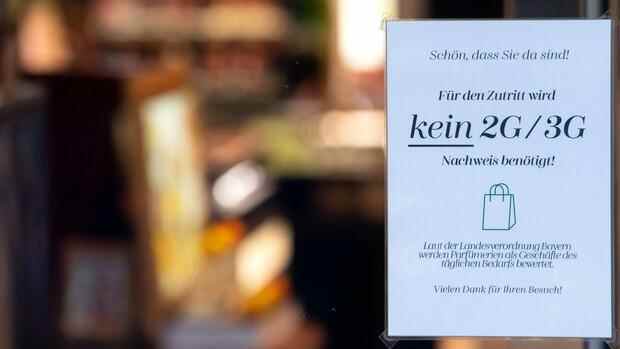Since perfumeries are classified as everyday shops in Bavaria, no 2G or 3G proof is required here.
(Photo: dpa)
Berlin When Chancellor Olaf Scholz (SPD) and the Prime Ministers met at the beginning of January, they agreed on uniform rules across the board due to the increasing number of corona cases. “Nationwide”, “regardless of incidence”, only vaccinated people and genesis could have access to retail stores (2G). And for restaurants, a test certificate or a booster vaccination is also required (2G plus). “We act together,” said Scholz.
At the end of January there is less and less of this joint action. The federal states are now applying the 2G rules that were announced “nationwide” three weeks ago in extremely different ways. On the one hand, this is due to the implementation by the prime ministers, but on the other hand, it is also due to the fact that more and more courts have recently overturned the 2G rules.
The retail industry in particular is now confronted with a patchwork of rules. While in Bavaria and Lower Saxony everyone is only allowed to shop with an FFP2 mask, in Berlin and North Rhine-Westphalia only vaccinated people and genese can still go to the shops.
And 3G applies in Baden-Württemberg: Everyone with a current corona test has access here. Bavaria and Saxony-Anhalt already announced during the federal-state meeting that they would forego a 2G-plus rule in the catering trade.
Top jobs of the day
Find the best jobs now and
be notified by email.
In the past few days, court rulings had overturned the 2G rule in Bavaria, Baden-Württemberg and Saarland. More could follow, dealers want to sue. The trade association is calling for a nationwide repeal.
This is long overdue, said HDE general manager Stefan Genth the Handelsblatt. This was also shown by corresponding court judgments in the countries. Shopping with a mask is a safe matter. The 2G rule, on the other hand, results in “massive sales losses”. According to a survey by the association, retail stores in city centers have had up to 60 percent fewer customers and up to 30 percent less sales since November.
The 2G rule is also increasingly causing a lack of understanding among SMEs. In addition, reports of rude and unreasonable customers and damaged goods accumulated. “There is now no understanding whatsoever of the fact that the political decision-makers themselves seem to be ignoring the judgments of the courts in various federal states, which testify to a lack of proportionality, for their own actions,” criticized Managing Director Ludwig Veltmann.
State lawyers against 2G in retail
Many European countries had recently lifted restrictions on unvaccinated people. Austria announced a corresponding step for Monday.
The Munich constitutional lawyer Martin Burgi also advocates the creation of nationwide regulations in view of the most recent 2G decisions by the courts. “Instead of continuing to complicate regulation or coming up with new requirements, it would be wiser to reduce the area to 3G plus the obligation to wear a mask,” Burgi told Handelsblatt. The federal government can specify this uniformly in the Infection Protection Act, so that the federal states are no longer allowed to deviate in this area.
So far, the Federal Infection Protection Act has provided an authorization basis for state regulations to impose restrictions in this area. So you can also create 2G regulations for retail and other areas. “However, the law contains some requirements that are not uncomplicated,” explains constitutional lawyer Burgi. After all, with Bavaria and Baden-Württemberg, countries “with really competent ministerial administrations” have already failed in court.
In addition: “To date, we have no evidence that staying in a retail store is in any way relevant to the virus process if you are wearing a mask,” Burgi told the Handelsblatt. “Therefore, the best thing would be to deregulate this area even further.”
The constitutional lawyer also refers to the pending judgments of the Federal Constitutional Court on the admissibility of the business closures last year. “It would be an important orientation for the time that followed if information came here as to whether this was fundamentally necessary or should not have been regulated so strictly even back then.” This then also entails the question of any financial compensation – not through voluntary payments by the State like the bridging aid, but as a mandatory consideration for the closure.
More: Industry hesitates about compulsory vaccination and sees problems with enforcement

